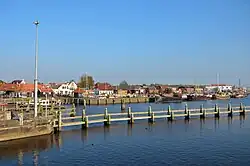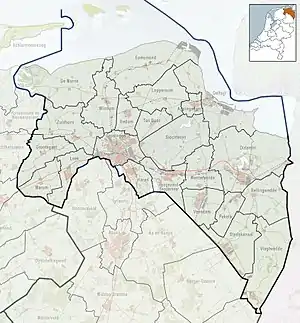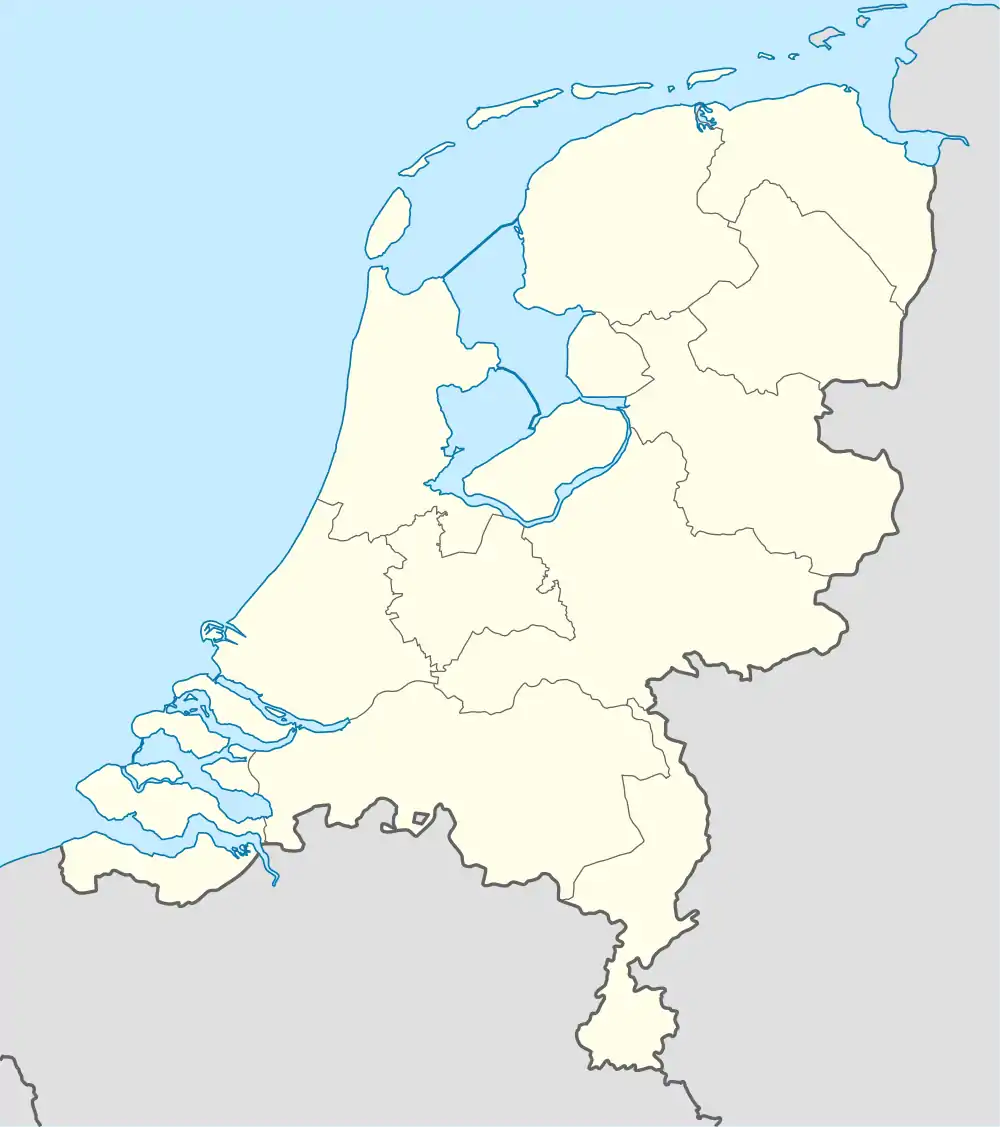Zoutkamp
Zoutkamp (Dutch pronunciation: [ˈzʌutkɑmp]; Gronings: Zoltkamp [ˈzɔːɫtkɑmp]) is a village in the municipality Het Hogeland which is part of the province Groningen in the Netherlands. The village started as a sconce. During the Dutch Revolt, it was the site of the Battle of Zoutkamp. Later it became a fishing village. The harbour was moved to Lauwersoog in 1969 as a result of the closure of the Lauwersmeer, and is nowadays used for recreational purposes. The economy of the village mainly depends on fishing.
Zoutkamp | |
|---|---|
 Zoutkamp in 2011 | |
 Zoutkamp Location of Zoutkamp in the province of Groningen  Zoutkamp Zoutkamp (Netherlands) | |
| Coordinates: 53°20′15″N 6°18′11″E | |
| Country | Netherlands |
| Province | Groningen |
| Municipality | Het Hogeland |
| Area | |
| • Total | 1.23 km2 (0.47 sq mi) |
| Elevation | 1 m (3 ft) |
| Population (2021)[1] | |
| • Total | 1,195 |
| • Density | 970/km2 (2,500/sq mi) |
| Time zone | UTC+1 (CET) |
| • Summer (DST) | UTC+2 (CEST) |
| Postal code | 9974 |
| Dialing code | 0595 |
| Website | zoutkamp.net |
History
Zoutkamp was first mentioned in documents in 1418 as Soltcampum.[3] Its first inhabitants might have been soldiers. Its name refers to salt and field, which probably means that it was a place for salt production.[4]
During the Dutch Revolt, the city of Groningen sided with Spain.[5] Most of the Ommelanden (country side) and the province of Friesland opted for the Dutch Republic. In 1576, a sconce was built at Zoutkamp by the Spanish. In 1589, the sconce was conquered in the Battle of Zoutkamp by the Dutch Republic under the command of William Louis of Nassau.[6] On 22 July 1594, after the Siege of Groningen, Groningen was forced to side with Dutch Republic.[5]
During the 17th and 18th century, fishers settled in Zoutkamp.[7] By 1756, Zoutkamp consisted of 25 houses.[4] In 1828, a harbour was constructed, and the church was built in 1836.[7] In 1840, the population had increased to 720 people.[8] In 1882, the fortification was demolished and the military function of Zoutkamp ceased.[7] During World War II, between 80 and 100 soldiers of the Kriegsmarine were stationed near Zoutkamp, however the village saw little action.[4]
Lauwersmeer
In the 1950s, there were calls to close the Lauwerszee, the bay near which Zoutkamp was located.[4] As part of the Zuiderzee Works, it was decided to build a dike between Friesland and Groningen, and turn the bay into Lauwersmeer. In 1969, the dike was completed, and a harbour was constructed at Lauwersoog.[9] The province of Groningen intended to use the harbour for recreational purposes only, because they were constructing the Eemshaven, as a new main harbour. Zoutkamp and the province of Friesland desired a commercial harbour. In January 1970, the conflict was brought to the States General of the Netherlands.[10][11]
Lauwersoog became a successful fishing harbour, however the fishers of Zoutkamp still use the registration "ZK" instead of "LO" to indicate their place of origin.[12] The harbour of Zoutkamp is nowadays for recreational boats only.[4] The ferry to Schiermonnikoog which used to depart from Zoutkamp and Oostmahorn was moved to Lauwersoog.[4][13]
Recent history
Until 2008, Zoutkamp was the site of a ground station of the Dutch Nationale SIGINT Organisatie (National Signals Intelligence Service), which intercepted satellite communications much like the U.S. National Security Agency.
The economy of Zoutkamp is still based on fishing and the village is not subject to a move to the city. As a result, it still has a lively centre with much retail. In 2019, it became part of the municipality of Het Hogeland.[8]
Gallery
 Old fishing houses
Old fishing houses Ice cream parlor
Ice cream parlor%252C_S%C3%A2ltkamp.jpg.webp) The old church
The old church The liars' bench. The sign reads "A lie here, a lie there. Don't say anything; it's all true."
The liars' bench. The sign reads "A lie here, a lie there. Don't say anything; it's all true."
See also
- ZK 14 – Sailing ship from Zoutkamp, bought by German bard and writer Martin Luserke in 1934
- Hunze
References
- "Kerncijfers wijken en buurten 2021". Central Bureau of Statistics. Retrieved 9 March 2022.
- "Postcodetool for 9974NA". Actueel Hoogtebestand Nederland (in Dutch). Het Waterschapshuis. Retrieved 9 March 2022.
- Eldest document of 1418 where Soltcampum is mentioned; zoutkamp.net
- "Geschiedenis". Zoutkamp.net (in Dutch). Retrieved 2022-01-14.
- Lidia Kooistra. "Stad Groningen belangrijk schaakstuk bij Nederlandse Opstand". De Verhalen van Groningen (in Dutch). Retrieved 9 March 2022.
- Emmy Wagenaar Hummelinck. "De slag om Zoutkamp, sleutel tot de bevrijding van Groningen". De Verhalen van Groningen (in Dutch). Retrieved 9 March 2022.
- Redmer Alma (1998). Zoutkamp (in Dutch). Zwolle: Waanders Uitgevers. ISBN 90 400 9258 3. Retrieved 9 March 2022.
- "Zoutkamp". Plaatsengids (in Dutch). Retrieved 9 March 2022.
- "Lauwersoog". Plaatsengids (in Dutch). Retrieved 9 March 2022.
- "Lauwersoog bij Groningen niet in veilige handen". Nieuwsblad van het Noorden (in Dutch). 30 December 1969. Retrieved 9 March 2022.
- "Hearing in gebouw Tweede Kamer". Nederlands dagblad (in Dutch). 5 January 1970. Retrieved 9 March 2022.
- "Vissers in Zoutkamp nog geen cent gezien". de Volkskrant (in Dutch). 21 October 1978. Retrieved 9 March 2022.
- "Geschiedenis". Oostmahornweb (in Dutch). Retrieved 9 March 2022.
External links
- Infosite about Zoutkamp (in Dutch language)
- Infosite about Zoutkamp harbour (in Dutch language)
- Webcam Zoutkamp harbour
- Infosite about historic fishery in Zoutkamp (in Dutch language)